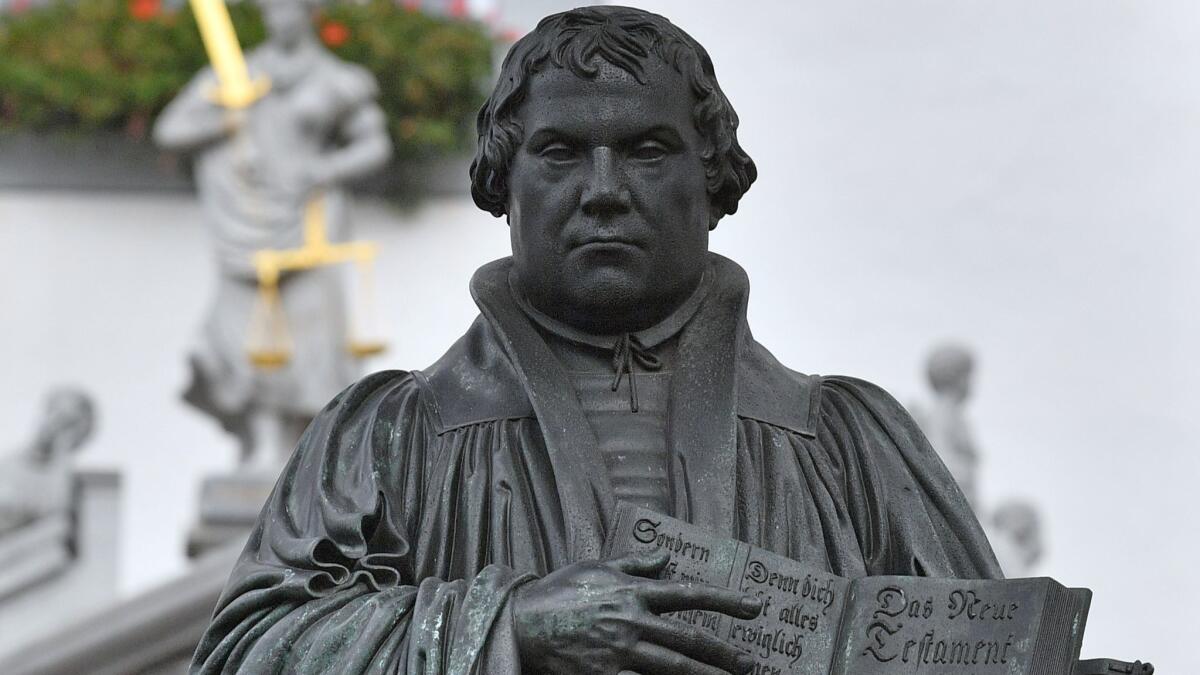Op-Ed: Elites v. Populists: The conflict goes back at least 500 years

How to deal with the Trump-supporting working class? Since the election, that question has rippled through liberal circles. Should white workers be condemned and quarantined, or cultivated and persuaded? The debate is not new. A version of it played out 500 years ago, between Erasmus of Rotterdam, the greatest of humanists, and Martin Luther, the founder of Protestantism.
Erasmus spent his life preparing a blueprint for a new Christian Europe. In works like “War Is Sweet to Those Who Have Not Experienced It,” he proposed a “design for living” based on the principles of tolerance and peace. His greatest feat was his revision of the Vulgate — the Latin translation of the Bible. For centuries, this document had served as the scriptural foundation of the Roman Church. A close inspection of it, however, showed that it was full of grammatical errors and scribal blunders. In 1500, Erasmus set out to learn Greek so that he could read the New Testament in the language in which it had originally been written and so uncover its true meaning.
Where Erasmus spoke of ‘barbarians,’ today’s pundits speak of ‘deplorables’ who don’t know what’s good for them.
When his new New Testament finally appeared, in 1516, it offered a fresh way of reading the Bible — not as a collection of supernatural acts but as the story of a transcendent being whose compassionate deeds could encourage readers to follow a similar path. This achievement inspired a school of “Erasmians” who shared his vision of a united, borderless Christendom.
But those Erasmians were a small band. Erasmus wrote exclusively in Latin, and he promoted Greek as no less essential for the truly cultivated. His education program, stressing instruction in those two ancient languages, was elitist, seeking not to prepare ordinary citizens for a useful life but to train a refined caste that could guide society. Those who mangled grammar were dismissed as “barbarians.”
Meanwhile, a different type of movement was gathering around Luther. An Augustinian friar, he argued that only by embracing Christ, rather than doing good works, could a man gain divine grace, and he thus objected to indulgences. These dispensations reduced the amount of time sinners had to spend in purgatory before gaining admission to heaven; in return, the Church expected a financial contribution. This seemed to reduce repentance to a transaction, and in protest, Luther prepared a set of theses for debate. On Oct. 31, 1517, (or so the story goes), he posted them on the door of the Castle Church in Wittenberg, Germany.
Soon appearing in print, the Ninety-five Theses spread across Germany and made Luther a household name. Denounced by the Catholic Church, he spoke out ever more forcefully against it. In addition to theological tracts in Latin, he wrote pamphlets in a folksy German that helped carry his message beyond the educated fringe who read Erasmus. At the heart of his program was a radical idea: The clergy do not constitute a superior spiritual class; all Christians are equal, part of a priesthood of believers.
Initially, Luther admired Erasmus, but over time, his incendiary language and emphasis on faith over works led to a rupture. Their conflict represented the clash of two world views. Erasmus was an internationalist intent on forging a peaceful Christian union; Luther was a German nationalist. Erasmus wanted to educate a learned cadre; Luther, to mobilize the masses. For years, they competed to win over Europe, but Erasmus’ rationalist and cosmopolitan creed lost out to Luther’s more ardent one. Luther created a broad movement that unleashed the Reformation and wrested control of much of northern Europe from the Roman Church.
As the rancor between Catholics and Protestants grew, Erasmus warned of the catastrophe he saw looming. After his death, in 1536, Europe would in fact descend into a century of religious-fueled violence, and Erasmus’ ideas about tolerance were forgotten or suppressed.
Some four centuries later, in an elegiac 1934 study, Stefan Zweig lamented that Erasmus had become “hardly more than a name.” In fact, he was “the first conscious European” and “the first to fight on behalf of peace.” Under his leadership, there had taken hold the unheard-of-ideal of “a United States of Europe.” But that ideal was never realized, and to Zweig, the reason was clear: Erasmus had mistakenly sought to teach the masses “from the heights” of idealism rather than go down among them and try to learn from them.
After World War II, however, Erasmus’ vision of a united Europe took hold: The principles on which the European Union was built resemble the humanist blueprint that Erasmus had drafted. His contribution has been explicitly recognized in one of the EU’s most popular initiatives — the Erasmus Program. Through it, young people in one member country can study at a university in another.
The program’s benefits have not been widely shared, however. Only about 5% of all European graduates participate in it, and they tend to come from better-off families. An Erasmus sojourn has become a marker of privilege, giving the program an elitist air.
That, of course, is a concern for the European project as a whole. The vote by Britain in 2016 to leave the EU exposed the gulf between worldly urbanites and the less mobile residents of small communities who felt left behind in the great global gold rush. More generally, the control that unelected bureaucrats in Brussels have over the lives of the EU’s 500 million people has fed charges of high-handedness.
These developments would no doubt have seemed familiar to Erasmus. His pluralistic and pacific creed came under constant challenge from populist forces. And when it came to defending those ideals in the face of rising nationalism, disruptive technology and deepening social divisions, he lacked both the tools and the vocabulary.
Today’s humanists, in both Europe and America, often seem similarly at a loss. While professing a love for humanity, they frequently appear isolated from and disdainful of it. The title of Thomas Frank’s 2004 book — “What’s the Matter with Kansas?”— presupposes that Republican working people are rubes tricked into voting against their interests. Barack Obama showed the same type of loftiness in his 2008 comment about how people in the hinterland “cling to guns or religion or antipathy to people who aren’t like them.”
Since the 2016 election, some liberal writers have dismissed white workers as a retrograde lot who, whatever economic hardship they may have suffered, deserve scorn. Where Erasmus spoke of “barbarians,” today’s pundits speak of “deplorables” who don’t know what’s good for them.
But are the deplorables truly irredeemable? In a new memoir, “White American Youth,” Christian Picciolini describes his affiliation with — and eventual break from — the neo-Nazis. When he was 14, he attended a gathering of a violent skinhead group and felt a sense of acceptance. He went on to open a record store in Chicago in which he sold white-power music. To keep it going, he also sold punk rock and hip-hop. Many of his customers were African American or Jewish or gay. He began to have “meaningful interactions” with them, as he recently told “Fresh Air,” and that destroyed “the prejudice that was happening inside of me.” Picciolini eventually co-founded a nonprofit that helps members of hate groups disengage.
Even white supremacists, then, are not beyond redemption: A show of empathy can sometimes change hearts filled with hate. Unfortunately, empathy seems in too-short supply among today’s humanists. If they in fact believe that their values represent all humankind and offer the best design for living, they should be eager to make that case to everyone.
Michael Massing is the author of “Fatal Discord: Erasmus, Luther, and the Fight for the Western Mind,” on which this essay draws.
Follow the Opinion section on Twitter @latimesopinion or Facebook
More to Read
A cure for the common opinion
Get thought-provoking perspectives with our weekly newsletter.
You may occasionally receive promotional content from the Los Angeles Times.










